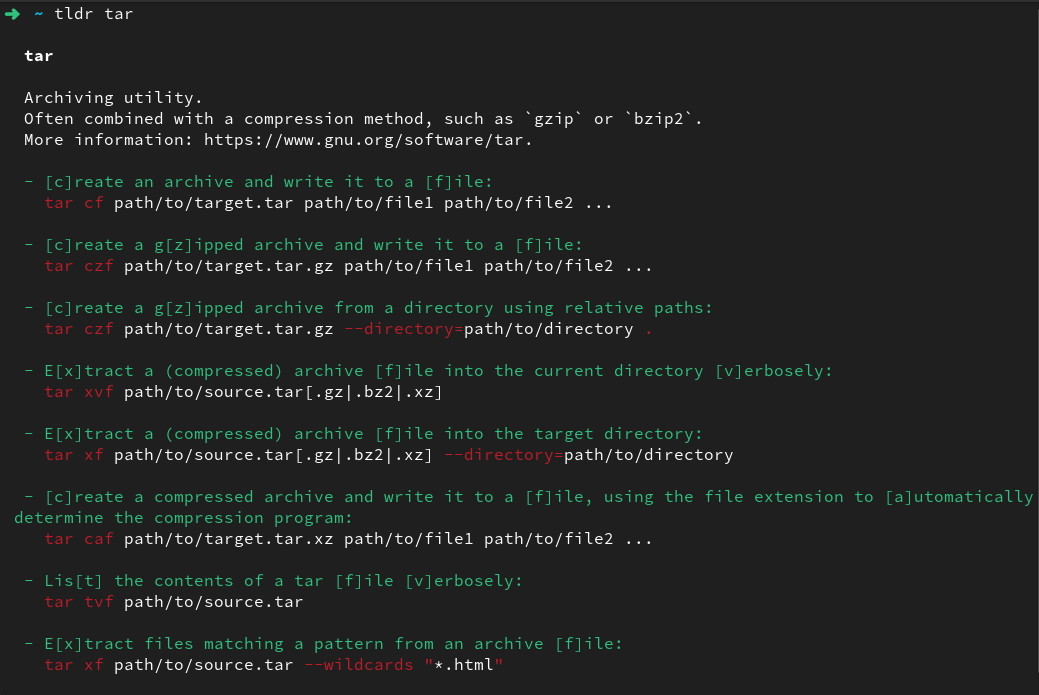🐍 Official Python command-line client for tldr pages 📚.
pip install tldrInstall the Python Client in an isolated environment using pipx:
pipx install tldrsudo pacman -S tldrsudo dnf install tldrsudo snap install tldrusage: tldr command [options]
Python command line client for tldr
positional arguments:
command command to lookup
options:
-h, --help show this help message and exit
-v, --version show program's version number and exit
--search "KEYWORDS" Search for a specific command from a query
-u, --update, --update_cache
Update the local cache of pages and exit
-k, --clear-cache Delete the local cache of pages and exit
-p PLATFORM, --platform PLATFORM
Override the operating system [android, freebsd, linux, netbsd, openbsd, osx, sunos, windows, common]
-l, --list List all available commands for operating system
-s SOURCE, --source SOURCE
Override the default page source
-c, --color Override color stripping
-r, --render Render local markdown files
-L LANGUAGE, --language LANGUAGE
Override the default language
-m, --markdown Just print the plain page file.
--short-options Display shortform options over longform
--long-options Display longform options over shortform
--print-completion {bash,zsh,tcsh}
print shell completion scriptYou can configure the behavior and output of the tldr client by setting environment variables. For example, in the .bashrc file:
export TLDR_COLOR_NAME="cyan"
export TLDR_COLOR_DESCRIPTION="white"
export TLDR_COLOR_EXAMPLE="green"
export TLDR_COLOR_COMMAND="red"
export TLDR_COLOR_PARAMETER="white"
export TLDR_LANGUAGE="es"
export TLDR_CACHE_ENABLED=1
export TLDR_CACHE_MAX_AGE=720
export TLDR_PAGES_SOURCE_LOCATION="https://raw.githubusercontent.com/tldr-pages/tldr/main/pages"
export TLDR_DOWNLOAD_CACHE_LOCATION="https://github.com/tldr-pages/tldr/releases/latest/download/tldr.zip"
export TLDR_OPTIONS=short
export TLDR_PLATFORM=linuxDetermines the platform that tldr will use based on the custom TLDR_PLATFORM environment variable or automatically via system platform detection.
For a complete list of supported platform values for the --platform option flag, refer to the help page.
Cache is downloaded from TLDR_DOWNLOAD_CACHE_LOCATION (defaults to the one described in the client specification), unzipped and extracted into the local cache directory. Pages are loaded directly from TLDR_PAGES_SOURCE_LOCATION if tldr <command> is used.
TLDR_CACHE_ENABLED(default is1):- If set to
1, the client will first try to load from cache, and fall back to fetching from the internet if the cache doesn't exist or is too old. - If set to
0, the client will fetch from the internet, and fall back to the cache if the page cannot be fetched from the internet.
- If set to
TLDR_CACHE_MAX_AGE(default is168hours, which is equivalent to a week): maximum age of the cache in hours to be considered as valid whenTLDR_CACHE_ENABLEDis set to1.
In order of precedence:
$XDG_CACHE_HOME/tldr$HOME/.cache/tldr~/.cache/tldr
If you are experiencing issues with tldr, consider deleting the cache files before trying other measures:
tldr --clear-cacheshtab is required for autocompletion using the --print-completion argument.
# bash
tldr --print-completion bash | sudo tee "$BASH_COMPLETION_COMPAT_DIR"/tldr
# zsh (it is recommended to check where zsh/site-functions directory is located)
## for macOS:
tldr --print-completion zsh | sudo tee /usr/local/share/zsh/site-functions/_tldr
## for Linux:
tldr --print-completion zsh | sudo tee /usr/share/zsh/site-functions/_tldrSee the shtab docs for other installation methods and
supported shells.
For autocomplete in fish, while it is not supported in shtab yet,
please see #183 for manually adding
an autocomplete for tldr for fish.
For networks that sit behind a proxy, it may be necessary to disable SSL verification for the client to function. Setting the following:
TLDR_ALLOW_INSECURE=1
will disable SSL certificate inspection. This should be avoided unless absolutely necessary.
Alternatively, It is possible to use a different certificate store/bundle by setting:
TLDR_CERT=/path/to/certificates.crt
Values of the TLDR_COLOR_x variables may consist of three parts:
- Font color:
blue, green, yellow, cyan, magenta, white, grey, red - Background color:
on_blue, on_cyan, on_magenta, on_white, on_grey, on_yellow, on_red, on_green - Additional effects, which depend on the platform:
reverse, blink, dark, concealed, underline, bold
You may specify as many additional effects as you want, while only one of font and background color.
Any of the values above may be omitted. For example, you can do similar things as the following:
TLDR_COLOR_NAME=""use default system font color with default background color without any effectsTLDR_COLOR_DESCRIPTION="white"for white text on default system background color without any effectsTLDR_COLOR_NAME="cyan dark"for dark cyan text on default system background colorTLDR_COLOR_NAME="on_red"for default system font color on the red background colorTLDR_COLOR_PARAMETER="red on_yellow underline"for underlined red text on yellow backgroundTLDR_COLOR_NAME="bold underline"for default system font and background colors with underline and bolded effects
The language that tldr will use is dependent on several factors. If you specify a language via the
--language flag, tldr will attempt to use that language and only that language. Otherwise, it will
try to use the language specified by TLDR_LANGUAGE. If it is not set, or the page does not exist in that language,
then tldr will use the
language set using LANGUAGE and LANG (ignoring the values C and POSIX).
If neither is set, then tldr will always attempt to get the en page. Finally, if LANG is set, it uses LANGUAGE, if set,
first, as the priority list to try languages in, followed by LANG if not included in LANGUAGE
and en as a fallback (assuming it does not already appear somewhere in LANGUAGE or LANG).
All language values should be set to a value that follows RFC 1766,
with the special exceptions of C and POSIX which are ignored.
If you wish to use your own instance of the tldr pages instead of the default repository, you
can either use the --source flag when using tldr or by specifying the following environment variables:
TLDR_PAGES_SOURCE_LOCATIONto control where to get individual pages from.- defaults to
https://raw.githubusercontent.com/tldr-pages/tldr/main/pages. - it can also point to a local directory using
file:///path/to/directory.
- defaults to
TLDR_DOWNLOAD_CACHE_LOCATIONto control where to pull a zip of all pages from.- defaults to
https://github.com/tldr-pages/tldr/releases/latest/download/tldr.zip.
- defaults to
Pages might contain {{[*|*]}} patterns to let the client decide whether to show shortform or longform versions of options. This can be configured with TLDR_OPTIONS, which accepts values short, long and both.

